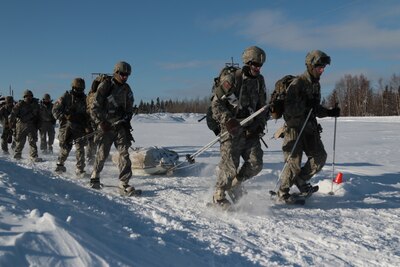By Army Sgt. 1st Class Joel Gibson, U.S. Army Alaska
FORT WAINWRIGHT, Alaska, March 6, 2018 — As temperatures
plummeted into the negative ’20s here, 17 teams of 10 soldiers each from across
U.S. Army Alaska and the Canadian Army competed in a series of cold weather and
mountainous warrior tasks Feb. 27-March 2.
Team 15 from 5th Squadron, 1st Cavalry Regiment, 1st Stryker
Brigade Combat Team, 25th Infantry Division, prevailed, scoring the highest
point total.
The annual U.S. Army Alaska Winter Games were held this year
at the Birch Hill Ski and Snowboard Area here. Events included a biathlon, a
written test, ahkio -- runnerless sledge towing -- shooting on snowshoes,
casualty evacuation and treatment, tent setup, downhill skiing, skijoring --
which is skiing while pulled, in this case by a vehicle, but a horse or dog
team can also be used -- and land navigation.
“It's important because it helps individuals training on
these specific events, that they can then take back to their units,” said Army
1st Lt. Michael McKeon, the winning team’s leader and a platoon leader with 5th
Squadron, 1st Cavalry Regiment.
“Like for us, we're the ski platoon for our troop, and we
didn't get really good at it until we trained for this competition,” he said.
“Now, we're excellent at skiing and can take that back to our unit.”
Building Arctic Skills
The games, as with any other military competition, serves a
variety of purposes.
“This process started three-and-a-half to four months ago,”
said Army 1st Lt. Christopher Rainsberger, the Arctic Warrior Games officer in
charge and a platoon leader with Headquarters and Headquarters Troop, 5th
Squadron, 1st Cavalry Regiment.
“Events like this are extremely important for [U.S. Army
Alaska] because one of the main things that the units up here focus on is
Arctic mobility and Arctic skills,” Rainsberger said. “These events are an
excellent way to train for that and to show how well your squad or your team is
proficient at skiing, setting up 10-man tents and shooting in Arctic conditions
under stress.”
“All the effort and the heart the teams put into practicing
really shows the teams are competing,” he added. “The teams practice weeks and
months before the event, and there's a lot of camaraderie with those teams.”









No comments:
Post a Comment